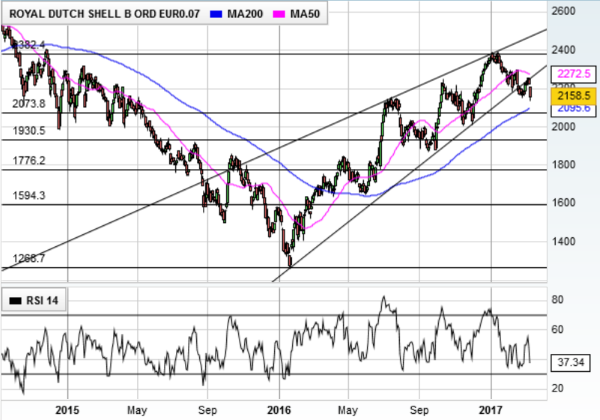Why clever Shell will remain dividend king
9th March 2017 17:19
by Lee Wild from interactive investor
Share on
Market commentators bang on about dividend – "it's unsustainable," they cry, "it'll have to be cut." No it doesn't. The payout has not been cut since World War II and it ain't gonna happen on Ben van Beurden's watch. Trousering another $7.3 billion (£6 billion) from asset sales Thursday only underpins shareholder returns.
Shell has just agreed to sell all its oil sands interests in Canada to local giant Canadian Natural Resources for $8.5 billion - $5.4 billion in cash plus $3.1 billion of Canadian Natural shares.
That includes the sale of its 60% stake in the Athabasca oil sands project. However, the pair has also teamed up to buy Marathon Oil Canada Corp for $1.25 billion in cash each. For that they'll go halves on Marathon's 20% stake in Athabasca.
Both deals are tipped to complete during the middle of 2017.
"This announcement is a significant step in re-shaping Shell's portfolio in line with our long-term strategy," said chief executive van Beurden, who paid £35 billion for LNG specialist BG Group last year.
"We are strengthening Shell's world-class investment case by focusing on free cash flow and higher returns on capital, and prioritising businesses where we have global scale and a competitive advantage such as integrated gas and deep water.
"The proceeds will accelerate free cash flow and reduce gearing and make a meaningful contribution to Shell's $30 billion divestment programme [by 2018]."

This is the second piece of good news for Shell in recent days, having also announced that Saudi Aramco will hand over $2.2 billion including debt to take control of their Motiva Enterprises US refining partnership.
Clearly, the stabilisation of oil prices is a great help for Shell. Brent crude has bounced back from last year's $27 low and traded sideways since topping $58 a barrel two months ago.
As UBS analyst Jon Rigby said this week, achieving that $30 billion target will make Shell "a simpler and easy to manage group with prospective benefits".
"As the balance sheet de-levers the important restart of a full cash dividend becomes increasingly likely, as lower debt/secure credit metrics are a pre-condition."
True, fourth-quarter profits announced last month missed forecasts, mainly due to lower trading and refining margins and higher taxation. For the full-year they slumped by two-thirds.
But cashflow from operations of $9.17 billion was far better than anticipated and free cash flow more than covered Shell's cash dividend.
Obviously, the oil price is key for Shell, and it really needs around $60 for a degree of comfort, so the latest slide to $52 on strong supply data is unhelpful.
However, the company has shown it can sell assets in the current environment, and, as the dividend is paid in dollars, UK investors get a boost from sterling's rapid depreciation since last summer's Brexit vote.
If Shell does keep the dividend at $1.88 per share in 2017 – and it should – the sterling equivalent at current exchange rates is 155p. That gives a prospective yield of 7.1%. Even if things go wrong, the oil price plunges and Shell halves the payout, it would still not be a disaster for income seekers.
This article is for information and discussion purposes only and does not form a recommendation to invest or otherwise. The value of an investment may fall. The investments referred to in this article may not be suitable for all investors, and if in doubt, an investor should seek advice from a qualified investment adviser.